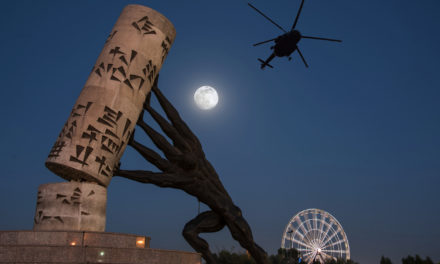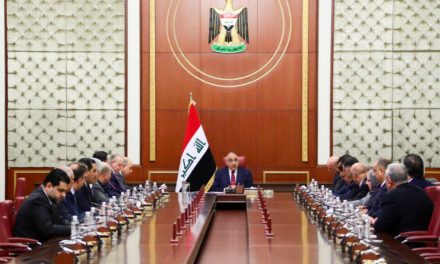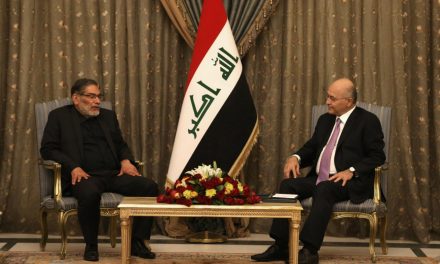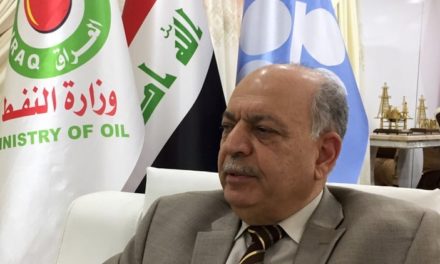(Baghdad-Kirkuk street sign in Erbil. Adam Jones/Flickr)
Recently, Da’ish terrorists managed to temporarily control some highways located between Baghdad and Kirkuk. As a result, they caught some Iraqi soldiers from Karbala and Anbar. Later, Iraqi forces announced that Da’ish had executed the abducted persons. This caused a wave of anger and shock across Iraq and led to questions about the geographical area and its security.
Since the liberation of Mosul, many reports have been released to warn the Iraqi government about the potential of Da’ish’s re-emergence in certain cities and their main roads such as Mosul, Kirkuk, Salahuddin, and Diyala. As it is their duty, the Iraqi government pledged to protect this realm. Unfortunately, terrorists were able to break the security procedures that Iraqi forces have adopted there. Consequently, many analysts have warned that we are going to suffer from a security vacuum in this region. They have also warned that Da’ish members know how to exploit this weakness and threaten Iraqi Security Forces.
Politically, there is a dispute between Baghdad and Erbil over the ways of securing this area. This new variable, which affects the security equation, can widen the gap between them and later lead to a worsening situation in this troubled area. Da’ish, in this case, will be the only party to benefit from this disagreement between Baghdad and Erbil, which have been fighting together against the terror of Da’ish for years.
Therefore today, Washington is encouraging both Baghdad and Erbil to work together to counter Da’ish in this area. American officials assure that this is the only suitable way to defeat terror and protect the Iraqi people. Otherwise, the catastrophe of Mosul falling into the hands of Da’ish fighters could happen again. Hence, it seems that the U.S. has taken a decision to accelerate such cooperation between these Iraqi parties under its auspices. For this, many of the American officials held various meetings with the leaders of Baghdad and Erbil to reconcile their differences and unite on common principles in order to achieve their goal. U.S. military commanders reminded Iraqi leaders of their vital cooperation that resulted in the liberation of Mosul in record time. “Kurdish Peshmerga Forces and Iraqi Security Forces, along with the Coalition, must all work together to ensure the lasting defeat of the Islamic State,” said Gen. Joseph Votel, the commander of US Central Command, during his visit to Erbil on June 26.
Unfortunately, confidence remains shaky in the mutual relationship between Baghdad and Erbil. Often times, an observer can feel that both sides are embracing a zero sum approach to the disputed areas. Each side wants to extend its living space at the expense of the other. This can never ever lead to any form of security in these areas and as a result people there will continue to face challenges. This was among the basic reasons for the rise of Da’ish in Iraq back in 2014. Therefore, we have to ask the question: are we ready to bear the consequences of repeating the same mistake and being at fault again?
Baghdad fears that Kurdish parties want to re-impose their hegemony on this area. This would turn back the clock prior to October 16, when Baghdad regained their official presence in Kirkuk and the other areas of the disputed areas. In a peaceful manner, Iraqi forces managed to remove Kurdish forces, the Peshmerga, from there and are currently in control over the entire territory. Erbil lost a lot because of that event, which came after their failed and unjustifiable referendum on independence from Iraq. Now that there are calls from the Kurdistan Region of Iraq for the redeployment of Kurdish forces in this area, some parties in Baghdad are alarmed that the U.S. has a desire to support the return of Kurdish authority to this region.
Locally, there are more divisions among people living there towards the role that must be played by Baghdad and Erbil to counter Da’ish. Some Kurdish villages are demanding Kurdish protection, as they fear revenge. They have concerns that huge displacements would occur in the aftermath of the war against Da’ish. Thus, they prefer to be under the authority of the Peshmerga forces. Some other Sunni districts also appealed for the Peshmerga to return to this area. ” The tribes of these areas will not stand for this and will do their best to bring back the Peshmerga forces who had a crucial role in keeping the safety of the land and its people,” said Muzahim Hwit, a spokesperson for the Arab tribes in Kirkuk. In return, other Arabs, and Turkmen announced their refusal to the plan of redistributing Kurdish forces in the contested areas. As well, they expressed their opposition to the American call for re-entry of the Peshmerga into these areas. They suppose that they would be targeted by this strategy.
In conclusion, we are facing a very complicated situation in this part of Iraq. Politically, there is an urgent need to protect the residents of this region from the political disagreements among above-mentioned powers. This is an important step to preserve the peaceful coexistence of these cities of mixed population. Therefore, it is essential for Baghdad and Erbil to pragmatically think about this challenge (the re-emergence of Da’ish). Both of them will pay a painful price if Da’ish attacks persist and their presence remerges. Thus, they have to cooperate in securing these areas in a way that ensures no party will be a loser over the other. This requires a new mentality and new slogans in their political camps. They must behave as Iraqi national leaders, rather than being leaders of their sectarian or ethnic groups. Hence, defeating Da’ish and saving peoples’ lives is the real victory that must unite all Iraqis. How this can be done is the big question that Baghdad, Erbil, and their regional and international supporters must answer before it is too late.

Diyari Salih
Diyari Salih is an Iraqi academic with a PhD in Political Geography, Baghdad and a Post-Doctorate in International Relations, Warsaw, focusing on geopolitical issues in Iraq.










